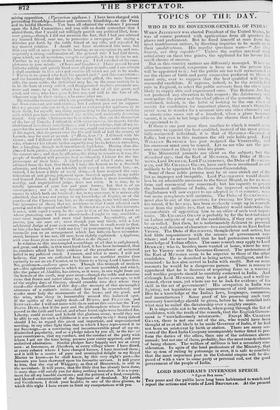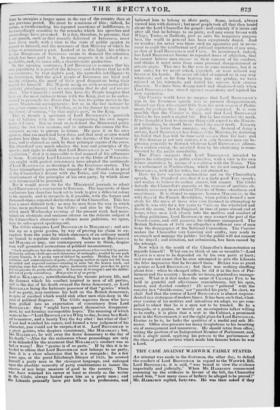LORD BROUGHAM'S INVERNESS SPEECH. " Ego et Rex met's." THE
press and the public have long been habituated to watch and report the actions and words of Lord BROUGHAM. At the present In the opening sentences, Lord BROUGHAM assumes that his own popularity is a proof of the Kin's; and declares that he will communicate, by that night's post, the agreeable intelligence to his Sovereign, that the good people of Inverness are loyal and worthy subjects, the proof of their good disposition being their reeard Ibr himself. Ills Majesty nett no such assurances of his sun;ects' attachment; mei we are certain that he did not receive them. The Chancellor would fain have the People imagine that lie is on the most intimate terms with the King, just as lie endea- voured to persuade the Peers that he was the prime mover in the recent. Ministerial arrangements : but as in the last instance be vas Dever sunmeined to Windsor, so in the former he never took tile iffierty of '.writing, "by that night's post," to the King. This is merely a specimen of Lord Baounne'et's quackish way el talking with the view of exaggerating his own impor- tance et Court. But he went on to defend the Ministerial policy during the fast two sessions, and to intimate the course the Go- \ eminent means to pursue in future. He gave it as his own opinion, that too much had been done, and that next session would produce less than the last. This is the doctrine of the Conserva- tives, and is claimed as such by their principal organs of the press. The Standard very much admires the tone and principles of the speech ; and sighs to think that Lord BROUGHAM is so " versatile a politician," that it is impossible to feel assured of his adherence to them. Certainly Lord LYNDHURST or the Duke of WE LLI NG- ToN might with perfect consistency have adopted the sentiments of Lord BROUGHAM as developed in the Inverness oration. The Times triumphantly quotes the remarks of the Standard, in proof of the Chancellor's favour with the Tories, and the consequent abandonment of the principles of his own party, by which alone such favour could be procured.
•
But it would never do for the Ministerial journals to admit Lord BROUGHANI'S conversion to Toryism. The ingenuity of their conductors has therefore been set to work to give a different colour to the speech, and to reconcile it, if possible, with the former and thousand-times-repeated declarations of the Chancellor. This has been a most (difficult task; as may be seen from the way in which it has been performed by the Globe ; and also by the Courier, which until Wednesday evening of the present week had main- tained an obstinate and ominous silence on the delicate subject of the Chancellor's character—a silence more judicious, we opine, than its subsequent speaking-out. The Globe compares Lord BROUGHAM to MIRABEAU; and sets him up as a great genius, by way of proving his claim to ex- emption from the rules by which statesmen of an ordinary mould are bound to regulate their conduct. Such men as BROUGHAM and MIRABEAU may, our contemporary seems to think, despise even well-grounded accusations of political inconsistency.
"Such assaults are but the ordinary tax on greatness when reached by genius. Mediocrity seldom challenges such inveteracy of onslaught ; assailed by one pack of party hounds, it is pretty sure of defence by another. Holding fast by the traditions and commonplaces of party—diverging neither to right nor left from the settled and expected routine—treading in none but the beaten track, and employing none but the orthodox topics, mediocrity neither provokes its party foes nor puzzles its party adherents. It has ever at its tongue's end the shibbo- leth test of party consistency. But genius is of no party."
And as Mammies:, notwithstanding his vicious private life, and the distrust which his conduct inspired in men of all parties, still to the day of his death swayed the fierce democracy, so Lord BROUGHAM being the fortunate possessor of that "genius" which is of no party, may continue his hold on the British democracy, in spite of conduct which would sink other men chin-deep in the mire of political disgrace. The Globe reproves those who have been gulled into an expectation of consistency from Lord BROUGHAM: they " might have spared themselves disappoint- ment, by not forming incompatible hopes." The meaning of which seems to be—" Lord BROUGH amisa Whig to-day, he may be a Radi- cal tomorrow, and a hearty Tory the day after : but what of that? If you had watched his career, and formed a true judgment of his character, you would not be surprised at it. Lord BROUGHAM is a great genius, who despises consistency, like MIRABEAU; but, like MIRABEAU, lie will sway the fierce democracy to the day of his death."—Alas for the statesman whose proceedings are only to be defended by the averment that MIRABEAU'S conduct was as bad or worse! But "genius is of no party." If by this it is in- tended to affirm that Lord BROUGHAM now belongs to no party, then it is a clear admission that he is a renegade; for a few years ago, at the great Edinburgh Dinner of 1825, he avowed himself a party man in the strongest language, and enlarged Upon the absolute necessity of party combinations to insure the success of any large measure of good to the country. Those who have watched his career at least as closely as the writer In the Globe, always looked upon him as a party man ; and the Liberals generally have put faith in his professions, and believed him to belong to their party. Some, indeed, always viewed him with distrust ; but most people took all that they heard
about the Lord Chancellor for gospel : and certainly if it turns out after all that lie belongs to no party, and may curry favour with Whigs, Tories, or Radicals, just as suits his temporary' purpose best, the world in general has been egregiously duped. And no wonder; for never was there such an apparatus put in move- ment to exalt the intellectual and political reputation of any man,
as that of Lord BROUGHAM and VAUX. So accustomed, indeed, has Lord BROUGHAM become to repeated doses of adulation, that he cannot believe men sincere in their censure of his conduct, and thinks it must arise from some personal disappointment or private pique. This may be the case in some instances, but it is not ours; Om we never asked, expected, or were refused any favour at his hands. Ile never offended or injured us in any way whatever; and so far from bearing him any grudge, we have rejoiced at his triumphs and hailed his success wiih sincere pleasure. We have been disappointed and displeased only when Lord throes:it:to has sinned against consistency and injured his own reputation.
The Courier would have us suppose that Lord Beewonem's aim in his Inverness speech was to prevent disappointment. Blessed are they who expect little from the next sessien of Parlia- ment, for perhaps they may be ageeably swot i-cd. It is very possible that the Courier is right, mid that Lord limn:neer thinks he has made a capital hit. But he has overshot the mark. If he thought it best to state any thing with regard to the Ministe- rial intentions, he should have stated the exact truth. Honesty in politics is better than cunning, any day. Instead of doing a service, Lord BROUGHAM has daniaged the Ministry, by declaring his belief that less will be done next session than the last : and if this damage is not very serious, it is only because men are be- ginning generally to distrust whatever Lord BROUGHAM affirms. To a certain extent, the mischief done by his chattering is coun- teracted by the pattic incredulity.
The Times suggests that Lord 13w:e'en:set intended tee injure his colleagues in public estimation, with a view to his own future exaltation by means of a coalition with the Tories. This is a refinement in Machiavelism, which we do not imagine Lord BROUGHAM, with all his wiles, has vet attained to.
Here we have various constructions put on the Chancellor's speech. The Standard sees that it is a right good Tory speech ; and wishes to believe its author sincere, but cannot. The Globe defends the Chancellor's sincerity at the expense of qualities ab- solutely necessary in an efficient Minister of State—steadiness and consistency. It is absurd to suppose, because Ahem-wet:, in the will days of the French Revolution, when politics formed a new study for the mass of those who were foremost in attempting to guide it, was able for a few years to "ride on the whirlwind and direct the storm," that in England, in time of peace abroad and at home, when men look closely into the motives and conduct of leading politicians, Lord BROUGHAM may reenact the part of the French orator, and still preserve his influence unimpaired. The British Reffirmers of 1834 are altogether a different race of (nen from the demagogues of the National Convention. The Courier makes the Chancellor very knowing and crafty, very ready to overreach and manage the public : but the public will not consent to be duped ; and irritation, not submission, has been caused by the attempt.
Now what is the result of the Chancellor's demonstration as regards himself? What can we think of one so versatile ?—Lord Eenoer is a man to be depended on by his own party at least; and we are not aware that he ever attempted to give the Liberals the false impression that he favoured them. BURKE was as great a genius as Lord Baounnem ; but there was nothing shuttling about him: when lie changed sides, lie did it in the face of Par- liament and the country ; he made no terms, practised no manage- ment. What is it that makes the name of CHARLES FOX to be held in grateful and affectionate remembrance, but his open, honest, and decided conduct? lie never " paltered" with the country in a "double sense," nor " puzzled his party." In short, we shall find that the course of Lord BROUGHAM is almost unprece- dented in a statesman of modern times. It has been such that, what- ever version of his motives and intentions we adopt, we are com- pelled to admit that he is a man not to be trusted. Be he a renegade, or a genius, or merely an unscrupulous talker willing to be crafty, it is plain that a seat in the Cabinet, a prominent post in the Government, is not the right place for Lord BROUGHAM. Genius as lie is, he lacks the qualities of a useful and safe Mi- nister. Office also presents too many temptations to his besetting sin of management and manoeuvre. He should retire from office; taking the position of an Independent Member of Parliament, and, with a single mind, applying his powers to the performance of the class of public services which made him famous before he was a Lord.





















 Previous page
Previous page